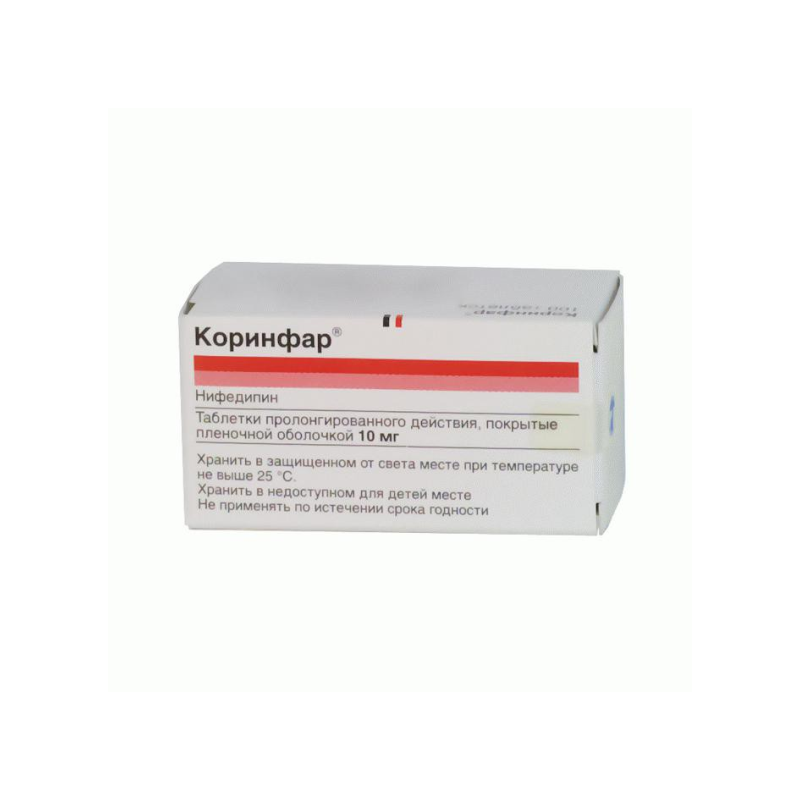



 All payments are encrypted via SSL
All payments are encrypted via SSL
 Full Refund if you haven't received your order
Full Refund if you haven't received your order
Selective blocker of "slow" Calcium channels, a derivative of 1,4-dihydropyridine. Mechanism of actionAntianginal, hypotensive. Reduces the current of extracellular Ca2 + into the cardiomyocytes and smooth muscle cells of the coronary and peripheral arteries; in high doses inhibits the release of Ca2 + from intracellular depots. In therapeutic doses, it normalizes the transmembrane current of Ca2 +, disturbed in a number of pathological conditions, especially in arterial hypertension. The time of onset of the clinical effect is 20 minutes, its duration is 4–6 hours. Indications and usageChronic stable stenocardia (angina pectoris), vasospastic stenocardia (Prinzmetal stenocardia, variant angina), essential hypertension. ContraindicationsHypersensitivity to Nifedipine and other 1,4-dihydropyridine derivatives, arterial hypotension (SAD below 90 mmHg), cardiogenic shock, marked aortic stenosis, unstable angina, acute myocardial infarction (during the first 4 weeks), pregnancy, feeding breastfeeding Use with caution in patients with severe mitral stenosis, hypertrophic obstructive cardiomyopathy, severe bradycardia or tachycardia,syndrome of weakness of the sinus node, heart failure, mild or moderate arterial hypertension, severe cerebral circulation disorders, myocardial infarction with left ventricular failure, obstruction of the gastrointestinal tract, renal and hepatic insufficiency, patients on hemodialysis (because of the risk of arterial hypotension) 18 years (efficacy and safety not established). Adverse reactionsCardiovascular: tachycardia, arrhythmia, peripheral edema (ankles, feet, legs), manifestation of excessive vasodilation (asymptomatic decrease in blood pressure, hot flushes to the face, feeling hot), marked decrease in blood pressure (rarely), syncope, heart failure (more often - increase in signs of existing ). The nervous system: headache, dizziness, general weakness, fatigue, drowsiness. From the digestive system: dyspepsia (nausea, diarrhea or constipation), dry mouth, increased appetite. Allergic reactions: rarely - pruritus, urticaria, exfoliative dermatitis. Drug InteractionsWith the simultaneous use of other antihypertensive drugs, as well as tricyclic antidepressants, nitrates, cimetidine (ranitidine and Famotidine do not have a significant effect on the metabolism of BPC), inhaled anesthetics, diuretics, the hypotensive effect of nifedipine may be enhanced. When nifedipine is combined with nitrates, tachycardia increases. Rifampicin accelerates nifedipine metabolism, which requires a change in the dose of nifedipine. Ethanol may enhance the hypotensive effect. If administered concurrently with cephalosporins (for example, cefixime), the bioavailability of cephalosporins may increase by 70%. Sympathomimetics, NSAIDs (suppression of prostaglandin synthesis in the kidneys and the retention of sodium ions and body fluids), estrogens (fluid retention in the body) reduce the hypotensive effect. Nifedipine inhibits the metabolism of prazosin and other alpha-blockers, which can lead to increased hypotensive effect. Nifedipine inhibits the excretion of vincristine from the body and may cause increased side effects of vincristine (if necessary, reduce the dose of vincristine). OverdosageSymptoms: headache, flushing of the skin of the face, prolonged marked decrease in blood pressure, depression of the function of the sinus node. Treatment: symptomatic. In severe poisoning (collapse, depression of the sinus node), gastric lavage (if necessary, small intestine) is performed, activated charcoal is prescribed.Calcium preparations are an antidote, it is shown in / in the administration of 10% calcium chloride or Calcium gluconate with subsequent switching to a long-term infusion. With a pronounced decrease in blood pressure, a slow intravenous dopamine, dobutamine, adrenaline or norepinephrine is indicated. It is recommended to monitor the blood glucose level (insulin release may decrease) and electrolytes. With the development of heart failure - in / in the introduction of strophanthin. In case of conduction disturbances - atropine, isoprenaline or an artificial pacemaker. Monitoring blood glucose and electrolytes (K +, Ca2 +) is recommended. Hemodialysis is not effective. Inside, after eating, without chewing and drinking plenty of liquid. The doctor selects the doses of the drug individually in accordance with the severity of the disease and the patient's sensitivity to the drug. Usually for adults the following dosing regimen is recommended: Chronic stable and vasospastic angina: the initial dose is 10 mg 2-3 times a day; with insufficient severity of the clinical effect, the dose is gradually increased to 20-40 mg 2 times a day. The maximum daily dose is 80 mg. Essential hypertension: the average daily dose is 10 mg 2-3 times a day; with insufficient severity of the clinical effect, it is possible to gradually increase the dose to 20-40 mg 2 times a day. The maximum daily dose is 80 mg. With a 2-fold prescription of the drug per day, the interval between doses should be an average of 12 hours (in the morning and evening). The minimum interval between doses of the drug should be at least 4 hours. The course of treatment is determined by the attending physician and is carried out for a long time. During the period of treatment, it is necessary to refrain from practicing potentially hazardous activities that require high concentration of attention and speed of psychomotor reactions, as well as from the use of ethanol. Patients over 60 years of age take the dose with caution. The abolition of the drug produced gradually (the risk of withdrawal syndrome). CautionsDuring treatment, positive results can be obtained from the direct Coombs reaction and laboratory tests for antinuclear antibodies. Storage conditionsIn the dark place at a temperature below 30 ° C, 3 years. |
